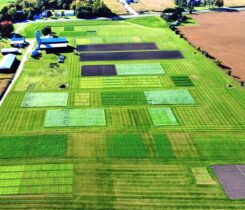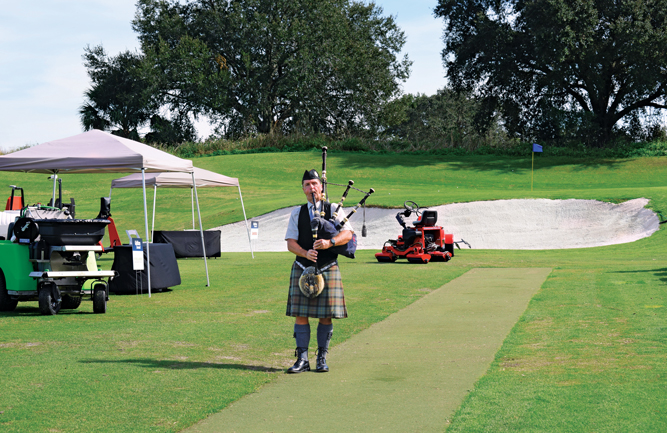Chris Nelson shares his journey to hosting the Rogers Charity Classic
Chris Nelson arrived at Canyon Meadows Golf & Country Club in mid-March, taking the helm as superintendent for one of Calgary’s most prestigious private courses.
 With the Rogers Charity Classic (formerly known as the Shaw Charity Classic) teeing off in just under six months (August 12-18), Nelson plays a crucial role in ensuring the course is in peak tournament condition for the Champions Tour event, which the club and its renowned parkland layout have proudly hosted for the past 13 years.
With the Rogers Charity Classic (formerly known as the Shaw Charity Classic) teeing off in just under six months (August 12-18), Nelson plays a crucial role in ensuring the course is in peak tournament condition for the Champions Tour event, which the club and its renowned parkland layout have proudly hosted for the past 13 years.
It’s a scenario that could keep other novice turf managers up at night, but Nelson says he doesn’t anticipate losing any sleep during tournament week.
“Is it bad to say nothing is going to bother me?” Nelson says. A question that could be mistaken for hubris when it’s actually muscle memory. This isn’t Nelson’s first go at Canyon Meadows or the Rogers Charity Classic.
Nelson hails from Golden, BC, a small town about 160 miles west of Calgary. He intended to make a career as a golf pro, but an opportunity presented itself, and he gave turf management a shot for a year.
“It took all of about three months to convince me that was the direction in golf that I wanted to go,” he says. “Nothing against the pro world, but I just really enjoyed turf.”

Canyon Meadows G&CC and the Rogers Charity Classic are the Champions Tour’s only annual stops north of the border. (Photo: Canyon Meadows G&CC)
He moved on to Canyon Meadows for an internship, which evolved into a job as the club’s senior assistant for 11 years under Superintendent Ken MacKenzie. Nelson left in 2017 to serve as the superintendent at Englewood Golf and Curling Club. Canyon Meadows brought him back in late January to replace the departing MacKenzie.
“I have a lot of experience with the Shaw (Charity Classic) because of my time as an assistant here,” he says. “So, I have a pretty good grasp on what it’s all about. You could say I’ve had some practice.”
Nelson is eager to experience the tournament through the lens of a superintendent. He’s quickly learning it will vastly differ from what he experienced as an assistant superintendent. His responsibilities will deal less directly with day-to-day agronomics and more with rules, tournament officials and working with the media covering the event and meetings. Lots of meetings.
While he’s recalibrated his expectations and management style for the event, Nelson has realized the importance of trusting those around him.
“I’ve learned you need just to let them take the ball and run with it and just be there to help steer them and to answer their questions,” he says. “Often, their method of doing things ends up better than what you had initially thought of.”
From a management perspective, Nelson’s priority upon returning to Canyon Meadows as superintendent was to connect with his team, get them dialed in and prioritize the tasks that must be addressed as they prepare the course for the Rogers Charity Classic.
“Agronomically, the biggest challenge is the amount of freeze-thaw (events) we get here in Calgary, creating a lot of winter kill for us,” Nelson says. “And it’s been tricky for us this year because we had a lot of rain through winter, which doesn’t go well on frozen ground.”

The 2024 Rogers Charity Classic will be Chris Nelson’s first professional tournament as superintendent after returning to the course in January. Nelson previously served as an intern and senior assistant at Canyon Meadows for 11 years. (Photo: Canyon Meadows G&CC)
To complicate matters, Canyon Meadows doesn’t cover its bentgrass greens, making them suspectable to cold-temperature injury and desiccation when they ice over for extended periods.
“As crazy as it sounds, I find our winters to be way more stressful than our summers,” he says. “You just don’t have as much control. It’s really hard to be confident that you’re making the right decisions because the weather changes here on a dime (in the winter).”
Come mid-August, winter will be a distant memory, and the main challenge will be managing the unexpected.
“There’s nothing about the tournament build-out, the expectations, or the people I’ll be dealing with that I’m not very comfortable with,” he says. It’s just being able to react (effectively) to the things you can’t plan for — sudden weather, drought, extreme heat — that’ll keep us on our toes.”
Nelson says they’re fortunate that the club’s championship occurs three weeks before the Rogers Charity Classic. So, course conditions will mimic what they anticipate will be expected for tournament week.
“I also have the luxury of having (Ken MacKenzie) here consulting,” Nelson adds. “He’s been my main mentor throughout my career. Without question, Ken will be the main person I’ll lean on leading up to the event to work with the (Tour) agronomist, my senior assistant Mat Moulton and the rest of my crew to get things to where they need to be.”
Agronomists with The Champions Tour have collected a lot of data about Canyon Meadows over the years, and there’s an anomaly with the green at No. 10 that no one can figure out.
According to Nelson, the data indicates that the No. 10 green is the course’s driest and firmest but also the slowest.
“It doesn’t make any sense,” he says. “It’s treated the same as the other greens — mowed at the same height, rolled the same quantity. But why it’s slower than the other (greens) is just one of those weird turf anomalies where it just doesn’t quite make sense. It’s a weird one,” Nelson says. “Maybe one day we’ll find out.”












